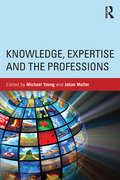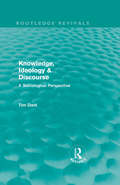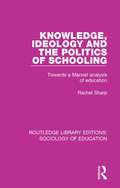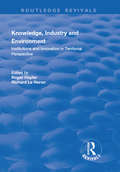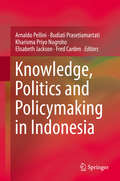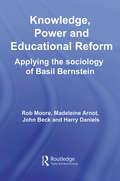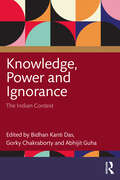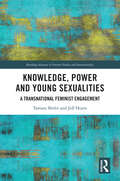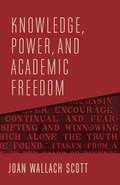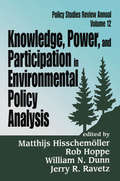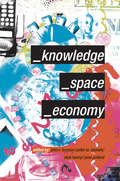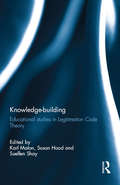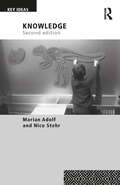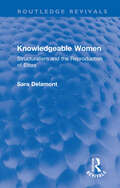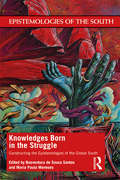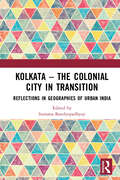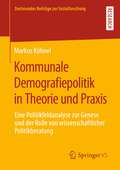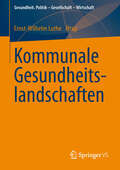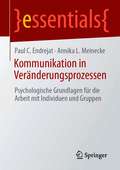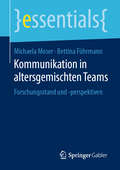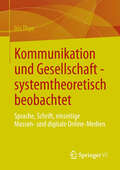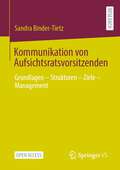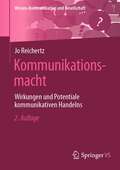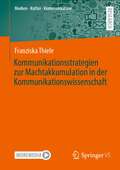- Table View
- List View
Knowledge, Expertise and the Professions
by Michael Young Johan MullerIt has long been recognised that specialised knowledge is at the core of what distinguishes professions from other occupations. The privileged status of professions in most countries, however, together with their claims to autonomy and access to specialised knowledge, is being increasingly challenged both by market pressures and by new instruments of accountability and regulation. Established and emerging professions are increasingly seen as either the solution, or as sources of conservatism and resistance to change in western economies, and recent developments in professional education draw on a competence model which emphasises what newly qualified members of a profession ‘can do’ rather than what ‘they know’. This book applies the disciplines of the sociology of knowledge and epistemology to the question of professional knowledge. What is this knowledge? It goes beyond traditional debates between ‘knowing how’ and ’knowing that’, and ‘theory’ and ‘practice’. The chapters cover a wide range of issues, from discussions of the threats to the knowledge base of established professions including engineers and architects, to the fraught situations faced by occupations whose fragile knowledge base and professional status is increasingly challenged by new forms of control. While recognising that graduates seeking employment as members of a profession need to show their capabilities, the book argues for reversing the trend that blurs or collapses the skill/knowledge distinction. If professions are to have a future then specialised knowledge is going to be more important than ever before. Knowledge, Expertise and the Professions will be key reading for students, researchers and academics in the fields of professional expertise, further education, higher education, the sociology of education, and the sociology of the professions.
Knowledge, Ideology & Discourse: A Sociological Perspective (Routledge Revivals)
by Tim DantThis student textbook, originally published in 1991, tackles the traditional problems of the sociology of knowledge from a new perspective. Drawing on recent developments in social theory, Tim Dant explores crucial questions such as the roles of power and knowledge, the status of rational knowledge, and the empirical analysis of knowledge. He argues that, from a sociological perspective, knowledge, ideology and discourse are different aspects of the same phenomenon, and reasserts the central thesis of the sociology - that knowledge is socially determined.
Knowledge, Ideology and the Politics of Schooling: Towards a Marxist analysis of education (Routledge Library Editions: Sociology of Education #50)
by Rachel SharpFirst published in 1980, this book argues that a theory of ideology is essential to a theory of education. It relates developments in the Marxist theory of ideology to the analysis of schooling in a capitalist society. Beginning with an appraisal of the early twentieth century liberal social theorists, including Weber, Durkheim, Veblen and Mannheim, it demonstrates that the weakness of their approaches arose from a failure to comprehend adequately the nature of capitalism. It then outlines the state of the theory of ideology at the time and applies the concept in an analysis of contemporary schooling, concluding with a discussion of its political implications. The application of the theory of ideology offers important possibilities for a radical socialist strategy on education.
Knowledge, Industry and Environment: Institutions and Innovation in Territorial Perspective (Routledge Revivals Ser.)
by Richard Le Heron Roger HayterThis title was first published in 2002. Bringing together a wide range of theoretical and empirical case studies from Canada, New Zealand, South Korea, Turkey, China, Germany, Spain, Sweden, Poland, South Africa, Japan, The Netherlands and the United Kingdom, this book addresses these neglected issues, in particular, contemplating the vitally important nexus between industry, environment and the knowledge economy.Throughout the book, four key themes and issues are explored: institution building strategies; agglomeration as territorial context; sustainable industrial-environmental processes and policy initiatives; globalization, learning and industrial location dynamics. The book concludes with an outline of future research directions within the paradigm.
Knowledge, Politics and Policymaking in Indonesia
by Arnaldo Pellini Budiati Prasetiamartati Kharisma Priyo Nugroho Elisabeth Jackson Fred CardenThis edited volume examines key questions about evidence-informed policymaking in Indonesia. It draws on insights and evidence acquired through the implementation of the Knowledge Sector Initiative, a donor-funded programme that aims to increase the demand for and use of evidence in policymaking in Indonesia. Featuring contributions from academics, policy researchers, policymakers and development practitioners, the volume will deepen readers’ understanding of how knowledge and politics shape the policymaking process in Indonesia. As such, it will be of interest to Indonesian and international researchers, academics, students, practitioners and policymakers concerned with various aspects of evidence-informed policymaking research and processes. In particular, regional and international development practitioners and development partners interested in learning from Indonesia’s efforts to improve how evidence is used to address key development challenges will find this volume valuable.
Knowledge, Power and Educational Reform: Applying the Sociology of Basil Bernstein
by John Beck Harry Daniels Madeleine Arnot Rob MooreThis book is made up of a selection of writings from an international team of scholars, highlighting the contribution made to the field of educational policy and educational policy research by Basil Bernstein's work on the sociology of pedagogy. These contributors explore, analyse and engage with contemporary political reforms of education, contemporary pedagogic debates and the changing nature of professional knowledge, relationships and structures. The subjects covered include: particular concepts such as voice research the significance of social class in relation to the language, schooling and home cultures differences between official and pedagogic recontextualising fields formation of different types of identities the construction of the learner formation of teacher identities and use of pedagogic discourses analysis of performance-based educational reforms and its impact on pedagogy.
Knowledge, Power and Ignorance: The Indian Context
by Abhijit Guha Gorky Chakraborty Bidhan Kanti DasWhat is knowledge, and ignorance? How is it decided? Do power and power relations influence this process? Does the spread of knowledge lead to more ignorance? Is ignorance socially produced? Is knowledge always socially contextualized? This book deals with these important questions on the interplay of knowledge, ignorance and power located in varied contexts in India.As systematic knowledge grows, so does the possibility of ignorance. Ignorance is a state which people attribute to others and is loaded with moral judgment. Thus, being underdeveloped often ‘implies a kind of stupidity or failure’. This volume seeks to be premised in a framework where ignorance is understood as being a socially produced and maintained phenomenon, where the ways of knowing and not knowing are interdependent. It is a novel attempt for an academic re-orientation of the Knowledge–Ignorance paradigm through a process of re-interpretation of the bounded purview attached with the existing epistemological understandings. It focuses on concrete case studies, often with an ethnographic stint. The volume critically looks at various aspects: Epistemological Issues; Understanding Community Perspectives and the State; Natural Resources, Power and Ignorance; Media and Production of Non-Knowledge; and other emerging areas. Each essay bears a striking similarity – that of understanding the complex processes and dynamics of the production of ignorance in a field of commonly held beliefs of 'knowledge' - be it scientific, societal, religious, magical or political - through the overarching realm of power.This interdisciplinary volume will be of interest to a cross-section of academics and students of sociology, social anthropology, political science, human geography, history, public policy and development studies.
Knowledge, Power and Young Sexualities: A Transnational Feminist Engagement (Routledge Advances in Feminist Studies and Intersectionality)
by Jeff Hearn Tamara SheferThis book troubles the ways young people have been constructed as ‘trouble’ through critical readings of the effects and impacts, politically and ideologically, globally and locally, of scholarship and practice directed at South African young people’s sexualities over the last three decades of addressing HIV, GBV and other sexual and gender justice challenges.Located primarily in South Africa, the book speaks to global concerns about the politics of knowledge and transnational flows of information and practice with respect to gender and sexuality and is framed by global imperatives and analyses located in transnational, postcolonial and intersectional feminist frameworks. The key argument developed here, and explored in relation to several different forms of research and practice, is that efforts to challenge HIV, GBV and unequal sexual and gender practices among young people, particularly as evident in heterosexual relationships, have tended to reflect and reproduce (re)new(ed) orthodoxies about sexuality, gender, family and young people, while bolstering global and local racist, classist ‘othering’ of certain communities and nation-states, and reiterating the ‘innocence’ and authority of those already privileged and centred.The book contributes to critical reflexive work on global practices of knowledge and its complex enmeshment with power in the terrain of sexual and gender justice work aimed at young people.
Knowledge, Power, and Academic Freedom (The Wellek Library Lectures)
by Joan Wallach ScottAcademic freedom rests on a shared belief that the production of knowledge advances the common good. In an era of education budget cuts, wealthy donors intervening in university decisions, and right-wing groups threatening dissenters, scholars cannot expect that those in power will value their work. Can academic freedom survive in this environment—and must we rearticulate what academic freedom is in order to defend it?This book presents a series of essays by the renowned historian Joan Wallach Scott that explore the history and theory of free inquiry and its value today. Scott considers the contradictions in the concept of academic freedom. She examines the relationship between state power and higher education; the differences between the First Amendment right of free speech and the guarantee of academic freedom; and, in response to recent campus controversies, the politics of civility. The book concludes with an interview conducted by Bill Moyers in which Scott discusses the personal experiences that have informed her views. Academic freedom is an aspiration, Scott holds: its implementation always falls short of its promise, but it is essential as an ideal of ethical practice. Knowledge, Power, and Academic Freedom is both a nuanced reflection on the tensions within a cherished concept and a strong defense of the importance of critical scholarship to safeguard democracy against the anti-intellectualism of figures from Joseph McCarthy to Donald Trump.
Knowledge, Power, and Participation in Environmental Policy Analysis
by Rob HoppeThis volume probes practical dilemmas and competing re- search perspectives in environmental policy analysis. Scholars working in different fields, research traditions, societies, and policy domains offer significant insights into the processes and consequences of environmental policy making.Part 1, "Coping with Boundaries," describes present-day conflict between experts and greater public participation in environmental policy. It shows that the institutionalization of increasingly complex environmental problems has led to a conflict between technocracy and democracy. Part 2, "The Transnational Challenge," examines modes of cooperation between grassroots movements, scientists, and regional authorities in the United States and Canada. These and other modes of cooperation laid the foundations for the Great Lakes Water Quality Agreement, increased the effectiveness of air pollution treaties, and increased climate change. Part 3, "Bio-Hazards: Policies and Paralysis," deals with environmental prob-lems closest to the everyday concerns of the public at large because they have immediate implications for food safety and other values. Part 4, "The Citizens' Perspective," focuses on citizen vis-a-vis environmental policy, noting that in order to make policies work citizens must be willing and able to participate in policy-making and cooperate in implementing environmental choices. Part 5, "Confronting Ordinary and Expert Knowledge," explores opportunities and constraints affecting public participation in evaluation of science. Part 6, "Developments in Research Programming," addresses such questions as whether scientists still have opportunities to do the research they want without being interrupted or disturbed by policy makers and other stakeholders. Part 7, "Policy Sciences' Aspirations," explores different avenues for improving environmental policy.Volume twelve in the PSRA series should inspire further investigations of the relations among knowledge, power, and participation in environmental policy. It will be of timely interest to environmentalists, policy-makers, scholars, and the general public.
Knowledge, Space, Economy
by John R. Bryson Peter W. Daniels Nick Henry Jane PollardFirst published in 2000. Routledge is an imprint of Taylor & Francis, an informa company.
Knowledge-building: Educational studies in Legitimation Code Theory (Legitimation Code Theory)
by Susan Hood Karl Maton Suellen ShayEducation and knowledge have never been more important to society, yet research is segmented by approach, methodology or topic. Legitimation Code Theory or ‘LCT’ extends and integrates insights from Pierre Bourdieu and Basil Bernstein to offer a framework for research and practice that overcomes segmentalism. This book shows how LCT can be used to build knowledge about education and society. Comprising original papers by an international and multidisciplinary group of scholars, Knowledge-building offers the first primer in this fast-growing approach. Through case studies of major research projects, Part I provides practical insights into how LCT can be used to build knowledge by: - enabling dialogue between theory and data in qualitative research - bringing together quantitative and qualitative methodologies in mixed-methods research - relating theory and practice in praxis - conducting interdisciplinary studies with systemic functional linguistics Part II offers a series of studies of pressing issues facing knowledge-building in education and beyond, encompassing: - diverse subject areas, including physics, English, cultural studies, music, and design - educational sites: schooling, vocational education, and higher education - practices of research, curriculum, pedagogy and assessment - both education and informal learning contexts, such as museums and masonic lodges Carefully sequenced and interrelated, these chapters form a coherent collection that gives a unique insight into one of the most thought-provoking and innovative ways of building knowledge about knowledge-building in education and society to have emerged this century. This book is essential reading for all serious students and scholars of education, sociology and linguistics.
Knowledge: Is Knowledge Power? (Key Ideas)
by Nico Stehr Marian AdolfAs we move through our modern world, the phenomenon we call knowledge is always involved. Whether we talk of know-how, technology, innovation, politics or education, it is the concept of knowledge that ties them all together. But despite its ubiquity as a modern trope we seldom encounter knowledge in itself. How is it produced, where does it reside, and who owns it? Is knowledge always beneficial, will we know all there is to know at some point in the future, and does knowledge really equal power? This book pursues an original approach to this concept that seems to define so many aspects of modern societies. It explores the topic from a distinctly sociological perspective, and traces the many ways that knowledge is woven into the very fabric of modern society.
Knowledgeable Women: Structuralism and the Reproduction of Elites (Routledge Revivals)
by Sara DelamontIn Knowledgeable Women, originally published in 1989, Sara Delamont traces the history of women's education and the elites it produces. She examines class and gender divisions in the structure and contest of education in Britain and the USA from 1850 to 1989. Her empirical focus is of course elites – especially elite women – but the justification for this is the belief that sociologists should study the powerful as well as the poor and powerless. Above all, Delamont argues the case for the relevance to sociology of a serious study of women, their schooling and professional training, and their struggle to enter the professions.She also encourages a broader focus to the sociology of education itself, viewing her subject from an anthropological structuralist perspective and encouraging the inclusion of anti-sexist ideas and material from other areas of sociology such as the study of science and stratification. She demonstrates for the first time the relevance to education of structuralist theorists such as Mary Douglas.Knowledgeable Women is a structuralist and feminist challenge to the sociology of education by an author highly regarded in Britain and the USA. It offers a non-sexist, structuralist, fully sociological sociology of education.
Knowledges Born in the Struggle: Constructing the Epistemologies of the Global South (Epistemologies of the South)
by Boaventura De Sousa Santos Maria MenesesIn a world overwhelmingly unjust and seemingly deprived of alternatives, this book claims that the alternatives can be found among us. These alternatives are, however, discredited or made invisible by the dominant ways of knowing. Rather than alternatives, therefore, we need an alternative way of thinking of alternatives. Such an alternative way of thinking lies in the knowledges born in the struggles against capitalism, colonialism, and patriarchy, the three main forms of modern domination. In their immense diversity, such ways of knowing constitute the Global South as an epistemic subject. The epistemologies of the South are guided by the idea that another world is possible and urgently needed; they emerge both in the geographical north and in the geographical south whenever collectives of people fight against modern domination. Learning from and with the epistemic South suggests that the alternative to a general theory is the promotion of an ecology of knowledges based on intercultural and interpolitical translation.
Kolkata — The Colonial City in Transition: Reflections in Geographies of Urban India
by Sumana BandyopadhyayThis book explores the spatial characteristics of the city of Kolkata in India in terms of the physical, economic, social, political, and environmental aspects of urban geography, and focuses upon the inherent processes that impact its transformation. It discusses different facets of urban geography and highlights the contemporary challenges of a major primate city in South Asia, which represents the conflicts between the traditional and the modern, the rich and the poor, the skyscrapers and the shanties. With its detailed empirical research and mapping exercises based on real-time remote sensing data, the book offers an understanding of a range of contemporary urban issues. It examines the spatial consequences of urban sprawl, land-use changes, ecological crisis, climate change, critical disasters, dynamics of the peri-urban interface, neighborhood restructuring, debates around heritage conservation, housing poverty, gray spaces, governance and the political landscape of the city. This book will be useful to students, teachers, and researchers of geography, especially human geography and urban geography, urban studies, urban development and planning, regional planning, social geography, governance, ecology, economics, and South Asian studies. It will also benefit urban planners, development professionals, and those interested in the study of the city of Kolkata and its transformations.
Kollektives Verzeihen: Die konstruktive Kraft eines rätselhaften Gefühls
by Oliver ErrichielloDas kollektive Verzeihen steht in seiner Rätselhaftigkeit der Liebe in nichts nach. Wir Menschen sind unergründliche Wesen. Zwar agieren wir meist bedächtig und rational und doch lassen sich viele Handlungen und Entscheidungen scheinbar nicht logisch herleiten. Das Verzeihen – jeder kennt es und hat es erfahren – gehört dazu. Verzeihen ist eines der wichtigsten und spannendsten Phänomene menschlicher Kommunikation. Das Buch beantwortet Fragen wie: Warum verzeihen wir einigen Menschen und anderen nicht? Warum braucht Verzeihen Zeit? Warum verzeihen Menschen einander seit jeher – oder lehnen eben gerade den Akt des Verzeihens ab? Verzeihen wir einzelnen Menschen im persönlichen Umfeld leichter oder schwerer als einer Gruppe von Menschen? Und vor allem: Warum ist das kollektive Verzeihen zeit- und kulturübergreifend wirksam? Im Zeitalter der hyperkomplexen und total vernetzten Welt, die keine Pausen mehr kennt, ist Verzeihen unerlässlich. Das Buch regt zum Nachdenken an und bietet wertvolle Impulse, um das eigene und das soziale Handeln besser zu verstehen.
Kommunale Demografiepolitik in Theorie und Praxis: Eine Politikfeldanalyse zur Genese und der Rolle von wissenschaftlicher Politikberatung (Dortmunder Beiträge zur Sozialforschung)
by Markus KühnelObgleich die Auswirkungen des Demografischen Wandels deutsche Kommunen vor erhebliche Herausforderungen stellen, haben sich bisher erst einzelne Kommunen auf den Weg gemacht, eine „Kommunale Demografiepolitik“ zu implementieren. Die soziodemografische Entwicklung einer Kommune führt demnach nicht automatisch zu demografiepolitischen Strategien. Welche Faktoren müssen zusammenkommen, damit eine Kommunale Demografiepolitik entstehen kann? Einen wesentlichen Unterschied bei der Genese von Demografiepolitik vor Ort kann die Beratung von Kommunalpolitik und -verwaltung machen. Welche Rolle spielt wissenschaftliche Politikberatung konkret beim Agenda-Setting und der Entstehung von Kommunaler Demografiepolitik? Markus Kühnel analysiert anhand des Multiple-Streams-Ansatzes, welche Bedingungen eine erfolgreiche Themensetzung Kommunaler Demografiepolitik begünstigen können und welche Bedeutung wissenschaftliche Politikberatung für die Genese Kommunaler Demografiepolitik haben kann.
Kommunale Gesundheitslandschaften
by Ernst-Wilhelm LutheIm deutschen Gesundheitssektor werden vorhandene Gestaltungspotentiale bei weitem nicht ausgeschöpft: die maßgeblichen Entscheidungen werden auf zentralstaatlicher Ebene getroffen - häufig zum Nachteil einer bedarfsgerechten Versorgung der Bevölkerung vor Ort. Egal ob es um Fragen gesundheitlicher Prävention, um Schnittstellenprobleme zwischen den Sektoren, um die Bewältigung altersabhängiger Krankheiten und Krankheitsfolgen, um die Inklusion behinderter Menschen oder um die bessere Vernetzung der gesundheitlichen Akteure geht - letzten Endes hängt alles ab von den jeweiligen Gegebenheiten einer "kommunalen Gesundheitslandschaft". Was also muss vor Ort getan werden? Das Buch entwickelt umsetzungsfähige Perspektiven einer dezentralen Gesundheitspolitik: es beschreibt die gesundheitlichen Herausforderungen bezogen auf bestimmte Zielgruppen, bietet ein umfangreiches Arsenal von Handlungsinstrumenten, beschreibt Verantwortlichkeiten im institutionellen Gefüge staatlicher und privater Akteure und ermöglicht einen Ausblick auf die örtliche Wirtschafts- und Unternehmensentwicklung bei Ausbau einer gut funktionierenden Gesundheitsregion. Mit seinem Erscheinen in der neuen Reihe "Gesundheit. Politik -Gesellschaft - Wirtschaft" (hrsg. von E.-W.Luthe und J.N. Weatherly) steht das Buch für die wachsende Erkenntnis, Gesundheitspolitik als interdisziplinäre Aufgabe zu betrachten.
Kommunikation in Veränderungsprozessen: Psychologische Grundlagen für die Arbeit mit Individuen und Gruppen (essentials)
by Annika L. Meinecke Paul C. EndrejatDieses essential zeigt, wie die Kommunikation in organisationalen Veränderungsprozessen erfolgreich gestaltet werden kann. Es baut auf psychologischen Theorien und dem Kommunikationsansatz der Motivierenden Gesprächsführung auf, um konkrete Handlungsempfehlungen für die organisationale Praxis zu bieten. Diese Empfehlungen werden anhand von Mitarbeitergesprächen und der Arbeit mit Gruppen illustriert. Der Fokus liegt darauf, wie die Veränderungsunterstützung der Mitarbeitenden nachhaltig gefördert werden kann.
Kommunikation in altersgemischten Teams: Forschungsstand und -perspektiven (essentials)
by Michaela Moser Bettina FührmannDieses essential beschreibt den Einfluss einer altersgemischten Gruppenzusammensetzung auf die Kommunikation im Teamkontext. Unterschiedliche Denk- und Arbeitsweisen sowie gegenseitige Altersstereotype bergen Kommunikationsprobleme, die eine erfolgreiche Teamarbeit behindern. Zur Vermeidung dieser Effekte und zur Nutzung des Innovationspotenzials altersheterogener Teams ist ein tieferes Verständnis der kommunikativen Prozesse und Dynamiken in altersgemischten Teams erforderlich.
Kommunikation und Gesellschaft - systemtheoretisch beobachtet: Sprache, Schrift, einseitige Massen- und digitale Online-Medien
by Iris ThyeDieses Buch setzt sich in wissenschaftlicher Exegese mit dem von Niklas Luhmann konstituierten systemtheoretischen Begriff der Kommunikation auseinander. Eine evolutionär angelegte Analyse der verschiedenen Kommunikationsmedien folgt der begriffstechnisch präparierten Leitfrage, welche Veränderungen Sprache, Schrift, einseitige Massen- und digitale Online-Medien bei den drei basalen Komponenten der Kommunikation - Information, Mitteilung, Verstehen - bewirken. Wenn Kommunikation mit Luhmann als die grundlegende soziale Operation zu verstehen ist, die Gesellschaft allererst konstituiert, dann lässt sich zeigen, dass insbesondere technisch bedingte Umwälzungen in der Kommunikation - Buchdruck, elektronische Medien, Web 2.0 - bahnbrechende Veränderungen in der Gesellschaft, ihren Strukturen und Semantiken begünstigen und vorantreiben.
Kommunikation von Aufsichtsratsvorsitzenden: Grundlagen – Strukturen – Ziele – Management
by Sandra Binder-TietzIn diesem Open-Access-Buch präsentiert Sandra Binder-Tietz eine umfassende Analyse der Kommunikation von Aufsichtsratsvorsitzenden börsennotierter Unternehmen. Deren komplexe kommunikative Rolle wird dabei erstmals systematisch erschlossen. Aus der externen Perspektive werden die vielschichtigen Anforderungen der relevanten Stakeholder wie Investoren, Aktionärsschützer, Stimmrechtsberater und Journalisten an die Kommunikation aufgezeigt. Aus der internen Perspektive von Aufsichtsratsvorsitzenden, Investor-Relations- und Public-Relations-Verantwortlichen werden die internen und externen Kommunikationsmaßnahmen von Aufsichtsratsvorsitzenden identifiziert. Auf dieser Basis wird die Notwendigkeit begründet, warum und wie die Kommunikation zu einem festen Bestandteil des Kommunikationsmanagements von Unternehmen werden sollte. Für Forschung und Praxis werden dafür Implikationen und Empfehlungen entwickelt, wie eine erfolgreiche Kommunikation von Aufsichtsratsvorsitzenden aussehen kann.
Kommunikationsmacht: Wirkungen und Potentiale kommunikativen Handelns (Wissen, Kommunikation und Gesellschaft)
by Jo ReichertzKommunikatives Handeln kann Macht entfalten, kann anderen ein bestimmtes Handeln nahelegen, ohne dass direkter oder indirekter Zwang dahintersteht. Die Frage ist, weshalb kommunikatives Handeln auch ohne Gewalt und Herrschaft Macht haben kann. Eine Antwort auf diese Frage hat die Soziologie bislang noch nicht geben können. Hier wird eine Antwort entworfen, indem gezeigt wird, dass und wie alltägliche Kommunikationsmacht sich im kommunikativen Mit- und Gegeneinander erst aufbauen muss, um dann wirken zu können. Dabei kommen der Beziehung der Menschen zueinander, deren gegenseitige Anerkennung und die daraus folgenden Auswirkungen auf die Identität der Beteiligten eine besondere Bedeutung zu. Ein solches Verständnis der alltäglichen Macht von kommunikativem Handeln kann dabei auch helfen zu verstehen, wann und unter welchen Bedingungen Kommunikation in den privaten und öffentlichen (digitalen) Medien wirksam sein kann. Ein Verständnis kann jedoch auch dabei helfen, selbst über kommunikatives Handeln Wirkung zu erzielen bzw. sich gegen kommunikative Zumutungen zu wehren.
Kommunikationsstrategien zur Machtakkumulation in der Kommunikationswissenschaft (Medien • Kultur • Kommunikation)
by Franziska ThieleDauerstellen sind in der Wissenschaft rar gesät. Daher sind Nachwuchswissenschaftler*innen gut beraten, ihre Karriere strategisch zu planen und in ihrem Forschungsfeld frühzeitig sichtbar zu werden. In der Wissenschaft, wie auch in anderen gesellschaftlichen Bereichen, wird zur Erzeugung von Sichtbarkeit und Aufmerksamkeit zunehmend auf soziale Medien zurückgegriffen. Das wirft die Frage auf, ob es für eine wissenschaftliche Karriere mittlerweile notwendig ist, in sozialen Medien wie Blogs, Twitter, Facebook, Academia.edu oder ResearchGate präsent zu sein. Die Autorin dieser Arbeit untersucht dies anhand qualitativer Interviews mit Kommunikationswissenschaftler*innen. Sie vergleicht die Relevanz verschiedener Kommunikationsstrategien zur karrierebezogenen Machtakkumulation, wie das Schreiben von Publikationen, Halten von Vorträgen oder die Präsenz in den Massenmedien mit der Bedeutung der Nutzung sozialer Medien.
